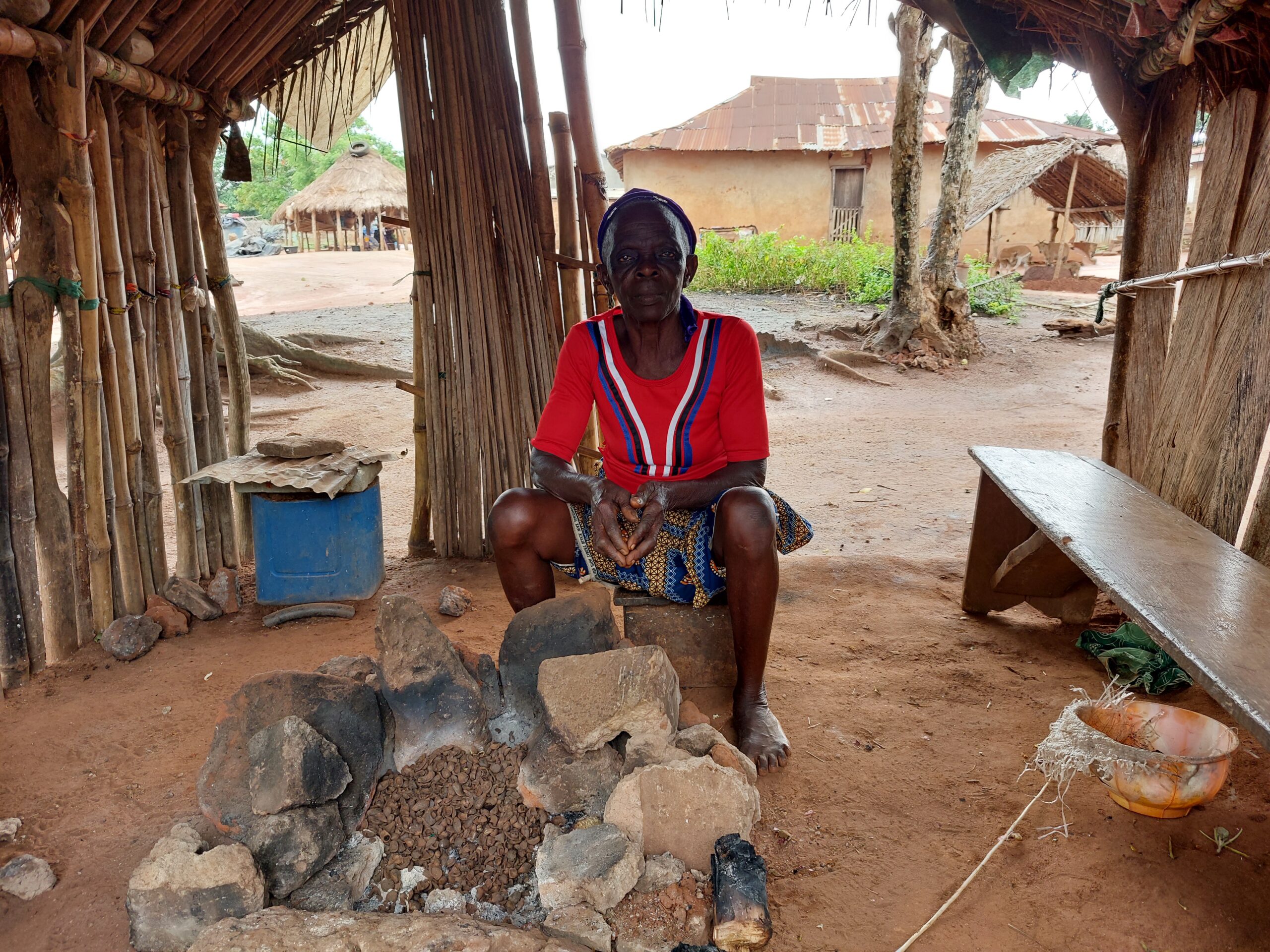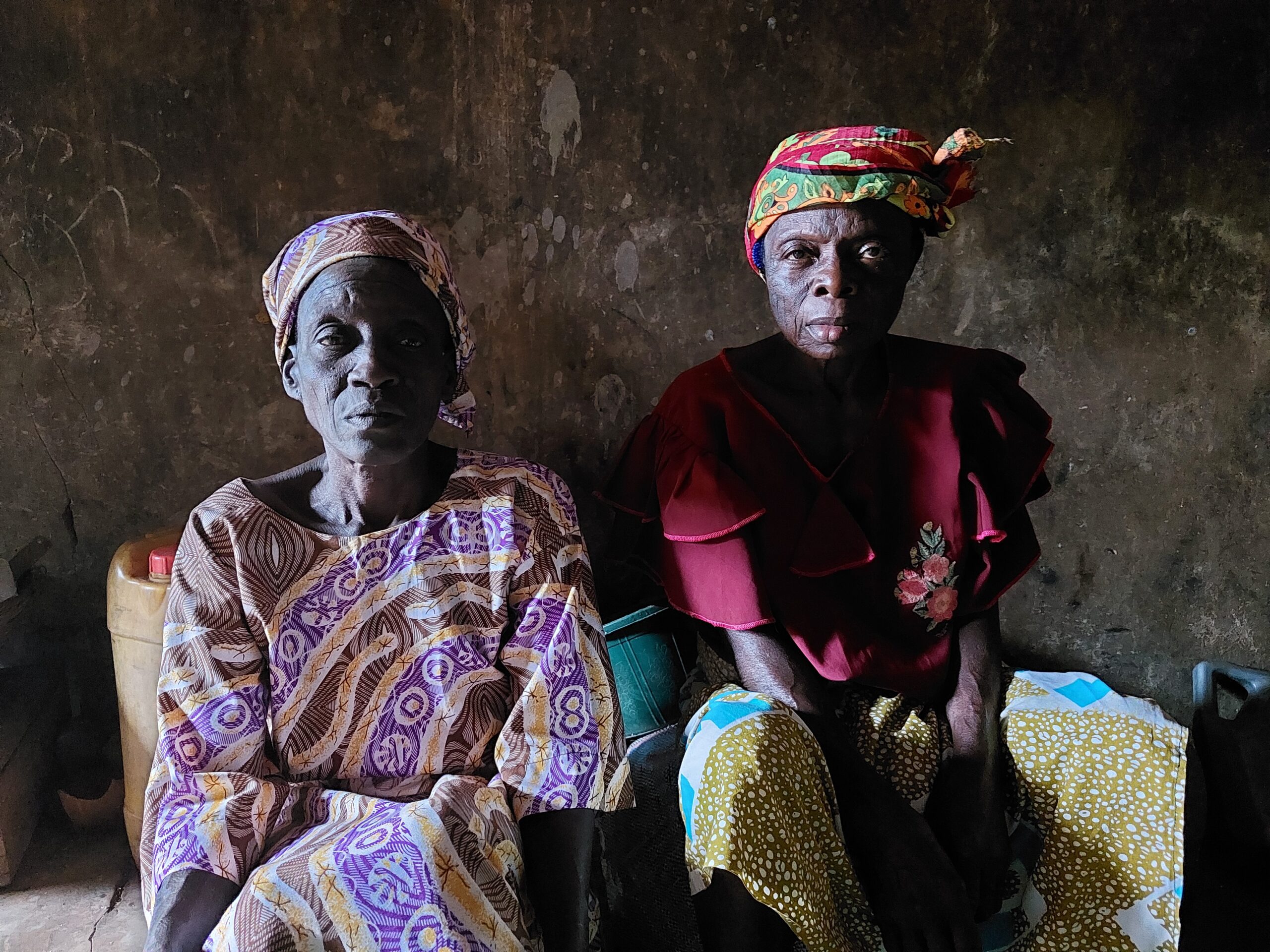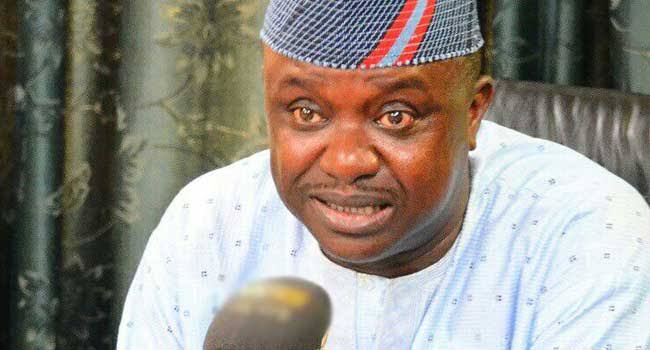(This is the third and final part of the series. Read the first part here and the second part here).
As is the case in other states in Nigeria, the elderly population enjoys little or no support from the government of Ogun State in the South-west region.
In Ibeku, a remote village in Yewa-North of the state, many senior citizens are frail, emaciated and unkempt. Sholape Ogunji, 80, is one of the oldest women in the community. But her advanced age does not stop her from farming, which provides her with basic needs, especially food.

“The government doesn’t exist except during elections when they bring ballots to the community school for us to vote,” she said with a sad look on her crinkled face “Since I didn’t go to school, I was born into poverty and farming is the only thing that has been feeding me.”
The widow also lamented exploitation by middlemen who travel down to the community to buy their farm produce at low prices that leave the farmers with no gain.
“I hardly make any profits because buyers come and we have no choice but to sell at lower prices. We run at a loss because we also have to buy fertilizers,” she said.
Close to Mrs Ogunji are Rebecca and Elizabeth Tetede, 81 and 82 respectively, both co-wives and widowed for more than 20 years. They were seated on the bare floor eating together from a leave-wrap of corn flour (eko) when this reporter visited. They said they depend on their children as they do not make much from farming.

The son of the second wife (Elizabeth), Idowu Tetede, told this reporter that the community, which is about 100 kilometres from Benin Republic, lacks basic amenities.
“Some of the people you see here travel to the Benin Republic in most cases which is about a two hours journey from here to access health care and it is not as expensive.
“The farming most old people do here is just for eating, they don’t have money to pay medical bills. After spending money on fertiliser, people from town come here to buy (farm produce) at lesser prices.”
Olaleye Adigun, 59, who retired as a teacher in 2020 and now employs some of the widows as farm hands, urged the government to provide opportunities for the older population.

“The government should assist these widows. There is little we retirees can do because not all of us are getting pension,” he said.
A community leader, Jacob Akinosi, 90, said many lives had been lost because the community does not have a functional healthcare centre.
“We have to go to the only pharmacy close to us and in times of emergency, we have lost lives,” he said.
When PREMIUM TIMES visited the only primary healthcare centre in the community, it was empty. The building was dilapidated with broken windows, old and rusted chairs and beds, and leaking roofs as it was raining.

One of the worst countries to age
The Global Agewatch Index 2015 ranks Nigeria as the 11th worst country to be old, out of 96 countries. The ranking highlights which countries are doing best for their older populations and how this links with policies towards pensions, health, education, employment and the social environment in which older people live.
The index shows Norway is the best country to be old in. Apart from Japan ranked at nine, all the top 10 countries are in Europe, North America and Australia, while African countries made up half of those with low-income security rankings and poor health status.
On the overall rankings and values for Africa, the index shows that of the total 96 countries, Mauritius topped the list at 38, followed by South Africa and Ghana at ranks 80 and 81 respectively. Morocco and Nigeria followed at 83 and 85 respectively.
As of September 2022, according to data by Statista, the life expectancy at birth in Nigeria was about 61.33 years. More specifically, this figure equalled 60 years for males and 63 years for females. The life expectancy at birth in Nigeria is among the lowest in Africa as well as in the world.
In his comment, the NUP Chairman for Ondo State said: “Generally Nigeria is not a place to write home about in respect of the welfare of the senior citizens.”
“We normally see what happens to retirees in advanced countries which are not happening in Nigeria and I want Nigeria to imitate countries where elders enjoy every bit of their life,” he said.
Lack of working Health Insurance
In December 2020, the Nigerian government disclosed plans to launch a special health insurance programme for elderly citizens and inaugurated a ministerial committee to work with the Nigeria Health Insurance Scheme (NHIS) in developing the framework for the scheme.
One year later in 2021, the NSCC announced it was packaging a health insurance scheme, but none of these plans has materialised, and senior citizens continue to battle for their lives amidst irregularities in pension and gratuity payment, and poor health care.
A publication on NHIS and its implication for elderly care in Nigeria by the International Journal of Science and Research in 2013 found that there is virtually no provision for the healthcare needs and social security of the elderly population in Nigeria.
It also pointed out that the NHIS is segregated in its coverage as it does not capture artisans, farmers, sole proprietors of businesses, street vendors and the unemployed.
In his comment, the Head, Corporate Affairs, Media and Communication at NSCC, Omini Oden, said while the provision of health insurance is not the duty of NSCC, it is working in partnership with the National Primary Health Care Development Agency (NPHCDA) to establish a geriatric care centre for old people, starting from Abuja.
“It is not in our place to create health insurance, but we are excited about the fact that we have an MOU with the National Primary Health Care Development Agency (NPHCDA) within the framework of the integrated care for older persons (ICOPE), which is domiciled in the WHO,” Mr Oden said.
“As a result of this partnership, we are going to pilot integrated care for older persons on two fronts in FCT and establish geriatric care centres starting soon from Abuja.”
He also disclosed that the NSCC is relieved by the inclusion of older persons in the National Health Insurance Authority (NHIA) Act signed by the President in May 2022, which “indicates that vulnerable older persons shall not be required to pay premium for coverage”.
“NSCC is gearing to engage NHIA on the possibility of evolving a realistic age-specific Basic Health Care Package for older persons, as we are sincerely concerned about the chronic disease burden peculiar to old age and the implications of coverage gaps, coverage appropriateness and equity,” he added.
Problem is implementation
The national policy on ageing states that an Advisory Council on Ageing will be established at the national, state and local government levels, to aid its implementation.
“The real issue like all issues with government policy is the method of implementation, correct implementation,” Gbenga Gbesan, the Ogun State coordinator for the Coalition of Societies for the Rights and of Older Persons in Nigeria (COSROPIN), said.
“The policy is an ideal framework on how to meet the needs of elderly people, from poverty to health, food and nutrition, housing, family, social protection and financial inclusion.
“It also provides what needs to be done on the pension scheme, but if the federal government has not set up its advisory council, how does it have the moral right to push the state or local government to do it,” he added.
The Executive Director of Enough is Enough Nigeria (EiE), a campaign for better governance in Nigeria, Yemi Adamolekun, decries the delay in pension payment and the implementation of the national policy on ageing.
“But they spend money on very useless things like building statues, buying private jets flying up and down off and on police convoys of many people, whereas these pensions are not a lot of money.
“Delays in pensions are particularly painful because the pension is a reflection of work that you have done. We took the money out of your salary, they’re not doing any favour, it is their right,” she said.

Bridging the gap
Ms Adamolekun is also a board member at Kaleyewa House, a non-governmental organisation established in 2002 by her mother, Kemi Adamolekun, which has supported over 400 older persons in Iju and Itagbolu in Akure North LGA of Ondo State.
“There is a national policy on ageing. At the state level, we have also seen different administrations do different things. Technically, the state governments can do their programmes, they don’t need to wait for a national policy.
“Different state governments have different state interventions, so they could have easily done a state intervention that was state specific but the elderly people, unfortunately, are not prioritised at the state level and the federal level,” she said.
On his part, the Executive Director of the Old Age Care Foundation in Nigeria, Olugbenga Alabi, said there is a dearth of geriatricians in Nigeria. Geriatrics is the branch of medicine that deals with care for the elderly.
Corroborating that, some researchers note that as of 2020, Nigeria has less than 100 geriatricians to care for its elderly.
Mr Alabi said his organisation visits the elderly, chats with them and gives them materials like foodstuff, and toiletries.
“Fundraising is a big challenge when it comes to caring for the old. Old people’s homes are not part of the culture, so not much investment has been made in that area,” he said.

Older Person’s Bill pending
The Nigerian Older Persons Rights and Privileges Bill has been passed by both chambers of the National Assembly as of December 2021 but still awaiting assent by the President.
The bill, according to the Deputy Majority Leader of the House of Representatives, Peter Akpatason, would ultimately protect elderly Nigerians and make provisions for their healthcare as well as ensure financial security for them after serving the country.
He added that the bill will also ensure adequate social safety nets for retirees and the elderly, considering the economic realities of the current times.
In September 2022, the UN International Expert on Human Rights of Older Persons visited Nigeria to assess the situation of older person’s rights.
In her response to the bill, the UN expert, Claudia Mahler, said: “The pending bill called ‘Older Persons (Rights and Privileges)’ would offer the most comprehensive legal framework ever available for older persons in the country, addressing among others, the social and economic challenges triggered by ageing.
“I urge President (Muhammadu) Buhari to assent to the law, as part of his extended legacy to promote the rights of older persons.”
She noted that the absence of social protection, including a regular distribution of pensions, contributes to the difficulty that older persons face in accessing social services, including appropriate healthcare, various care options, and adequate housing.
A copy of the pending bill obtained by PREMIUM TIMES shows that it provides answers to some of the troubling issues concerning older persons in Nigeria and avails them of the opportunity to hold the government accountable.
When asked why the president has not signed the bill into law, the Senior Special Assistant to President Muhammadu Buhari on Media and Publicity, Garba Shehu, directed this reporter to the Senior Special Assistant to the President on National Assembly matters, Babajide Omoworare.

Bill to start afresh
While the president has not stated reasons for withholding assent to the bill, Mr Omowoware explained that the bill may need to be revisited because it has elapsed the time frame the president can act on it, as prescribed in the constitution
“The bill passed in the House of Representatives on 2 March 2021 and there was concurrence in the Senate on 7 December 2021 but the bill was not passed out of the National Assembly until 21 April 2022 and then sent to the president, meaning he has 30 days to sign, which has since elapsed.
He also noted that it is a private bill, adding that there are many reasons the president could have withheld assent.
“It could be the financial implications and it could be that there exist some other acts and there seems to be an overlap of responsibilities,” Mr Omoworare said.
“The bill is a good bill, looking at the substance. It is a laudable bill that provides for the prohibition of discrimination and the need to educate and enlighten Nigeria about protecting the rights of old people. But a bill may not get assented to if there are issues that will be problematic in the future,” he said.
Mr Omoworare, however, recommended that the sponsor of the bill should identify the gaps and represent it at the third reading or start afresh.
“The sponsor will look at the bill and look at the gaps, and what do we do to fill the gap. If those things we can do on time, then the bill can be represented at the third reading. We have precedent to that and the rule of both the Senate and Representatives provides for it.
“On the other hand, if it can’t be done, then it has to start afresh – it has to start from the first reading, the second and all over again,” the presidential aide said.
However, the President of COSROPIN, Eze Ajoku, who confirmed that the bill was sponsored by Ezewa Onyewuchi, a senator and former member of the House of Representatives, believes the bill “will still be signed.”
Government reacts
On the less than N5,000 monthly pensions for retirees in the state, the Head of Service, Ogun State, Nafiu Aigoro, told PREMIUM TIMES that the government in July set up two committees to review the contributory pension scheme and to oversee consequential adjustments in pensions paid to retirees in the state.
“We are waiting for the committee report, which will cover all pensioners in the state to determine the way forward for the Labour-Government relationship,” he said.
The Director-General of the Ondo State Pensions Commission, Jaiyeola Olowosuko, did not directly speak on the backlog of unpaid gratuity in the state.
“The Contributory Pension Scheme is 100 per cent working in Ondo State. If you are talking about those who worked under the defined benefits pension scheme, then that is a national issue,” he said.
On the issue of setting up a national advisory council on ageing as stated in the National Policy, Mr Oden of NSCC clarified that in place of that, the NSCC board was constituted in 2021.
 He added that “the centre is working to launch the national action plan on ageing, which is going to be a full operationalisation of the policy.”
He added that “the centre is working to launch the national action plan on ageing, which is going to be a full operationalisation of the policy.”
“We have 34 stakeholders on the board for ageing and we are trying to domesticate the national policy on ageing at the state and local level,” he added.
This is the third and final part of the series. Read the first part here and the second part here.
This article was produced as part of the Inequality Reporting Fellowship of the Africa Centre for Development Journalism (ACDJ) supported by the MacArthur Foundation through the Wole Soyinka Centre for Investigative Journalism.



